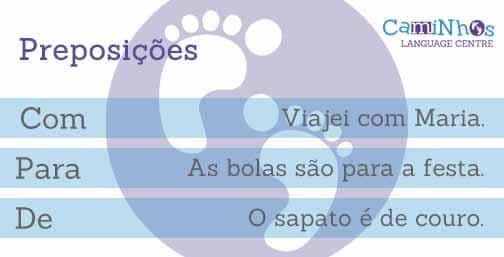Blog
Prepositions in Portuguese – Learn Brazilian Portuguese
- Thursday May 20th, 2021
- Posted by: Amanda Ennes
- Category: Learn the Portuguese Language and Portuguese Grammar

Prepositions are invariable words that link two elements in a sentence, maintaining a relationship between them. Learning the most common prepositions in Portuguese will help you improve your writing and capability of speaking in a fluent and fluid manner.
Table of Contents
ToggleThe use of prepositions in Portuguese
Most prepositions establish meanings between sentences that are defined by the context. They can express place, cause, subject, goal, and more. Check a few uses of the prepositions in Portuguese:
To express ownership
O novo carro de Paulo é preto. (Paulo’s new car is black.)
To express companionship
Fui à praia com a minha mãe. (I went to the beach with my mom.)
To express place
Juliana mora em Salvador. (Juliana lives in Salvador.)
To express means
Mário e Gilberto voltaram para casa de avião. (Mário and Gilberto went home by plane.)
To express goal
Tirei férias para descansar. (I took some vacation to rest.)
To express cause
Ana morreu de tuberculose. (Ana have died of tuberculosis.)
To express subject
Não quero falar sobre política. (I do not want to talk about politics.)
To express a material
Esta casa é feita de tijolos. (This house is made of bricks.)
Prepositions in Portuguese
Preposition A
The preposition “a” is one of the richest in meaning in the Portuguese language. It can express different things, such as direction, time, place, mean, and more.
➤ It is important to notice:
A + a = à
A + o = ao
A + as = às
A + os = aos
Examples:
Emprestei meu caderno ao menino. (I lent my notebook to the boy.)
Fui a Lisboa durante minhas férias. (I went to Lisbon during my vacation.)
Sua roupa cheia a rosas. (Your clothes smell like roses.)
➤ In informal Brazilian Portuguese, it is also common to use “para” instead of “a” in some cases.
Example: Jorge deu um presente à filha. ➔ Jorge deu um presente para a filha. (Jorge gave a present to his daughter.)
Preposition Após
Indicates posteriority.
Example: Mariana dorme após o almoço. (Mariana sleeps after lunch.)
Preposition Até
Indicates the end of a place, an action, number, or time.
Examples:
O muro da minha casa vai até o fim da rua. (The wall of my house runs to the end of the street.)
Jogou futebol até ficar cansado. (He played football until he was tired.)
Daniel sabe contar até dez. (Daniel knows how to count to ten.)
Preposition Com
We use the preposition “com” in Portuguese to indicate companionship, means, or circumstances.
Examples:
Bruno foi ao teatro com Bento. (Bruno went to the theater with Bento.)
Estou com fome. (I am hungry.)
Cortou a cebola com uma faca. (He sliced the onions with a knife.)
Preposition Contra
Express opposition.
Example: Todos da minha família são contra o aumento de impostos na cidade. (Everyone in my family is against the tax increase in the city.)
Proposition De
Just like the preposition “a”, “de” also have different uses. It may express ownership, comparison, origin, cause, time, quantity, and more.
➤ It is important to notice:
De + a = da
De + o = do
Da + a = das
De + os = dos
Examples:
Os chinelos de Ricardo são azuis. (Ricardo’s flip flops are blue.)
O prato do dia é carne com batatas. (The dish of the day is meat with potatoes.)
Bianca é mais simpática do que Fabíola. (Bianca is nicer than Fabíola.)
Marta chegou de Manaus. (Marta arrived from Manaus.)
Choveu de tarde. (It rained in the afternoon.)
Proposition Desde
The preposition “desde” is used to indicate a point in time or space that indicates a starting point.
Example: Estou te esperando desde às 8:00. (I have been waiting for you since 8 am.)
Preposition Em
Indicates time, place, means, or method.
➤ It is important to notice:
Em + a = na
Em + o = no
Em + as = nas
Em + os = nos
Examples:
Os portugueses chegaram ao Brasil em 1500. (The Portuguese arrived in Brazil in 1500.)
Ficarei na casa de Joana até a chuva passar. (I will stay at Joana’s place until the rain stops.)
Os alunos saíram em grupo. (The students left in groups.)
Preposition Entre
Indicates a situation or state between two things.
Example: Minha casa fica entre a praia e a lagoa. (My house is located between the beach and the lagoon.)
Preposition Para
The preposition “para” in Portuguese may indicate objective, direction, opinion, and time.
➤ In this case, in informal Brazilian Portuguese we use:
Para + a = pra
Para + o = pro
Para + as = pras
Para + os = pros
Examples:
Vou voltar para São Paulo amanhã. (I will come back to São Paulo tomorrow.)
Comprei um brinquedo para Júlia. (I have bought a present for Júlia.)
Sua opinião é muito importante para mim. (Your opinion is very important to me.)
Attention! To learn more about the difference between the prepositions “por” and “para” in Portuguese, check this blog post Differences between Por and Para in Portuguese | Lesson 14.
Preposition Por
We use “por” for duration of time, place, cause, means, price, and more.
Examples:
Gabriel nadou por três horas seguidas. (Gabriel swam for three hours straight.)
Troquei um anel por uma blusa. (I exchanged a ring for a blouse.)
Jorge viajou por toda Europa. (Jorge traveled all over Europe.)
Preposition Sem
Indicates deprivation or lack of something.
Example: Fiquei sem comer porque estava atrasada para a aula. (I have not eaten because I was late for class.)
Preposition Sob
Indicates an inferior status, subjection, or dependency. It is also equivalent to “embaixo de”.
Examples:
A caixa estava sob a mesa. (The box was under the table.)
Sérgio está sob a minha tutela. (Sérgio is under my care.)
Precisarei pagar multa sob pena de prisão. (I will need to pay a fine under the penalty of imprisonment)
Preposition Sobre
It means physical elevation or dominance. Equivalent to “em cima de”. It can also express subject.
Examples:
A carta está sobre a mesa. (The letter is on the table.)
Amanhã vamos ter aula sobre preposições em português. (For tomorrow’s class we will talk about the prepositions in Portuguese.)
To check other Portuguese tips and lessons, see our Learn the Portuguese Language and Portuguese Grammar page on this blog. Study Brazilian Portuguese at Caminhos Language Centre.


 Deutsch
Deutsch Français
Français Português
Português Español
Español


My name is Reginald I’ve been wanting to learn Portuguese I met a Portuguese woman. And our communication is very hard because she speaks very little English and I speak no Portuguese she lives in South Paulo I know that South America has many different regions so Portuguese is spoken in different ways how would I be able to take a class or have a video sent to me teaching me how to speak. Portuguese so I am able to communicate with her please let me know
Hi Reginald, we offer online classes if you are interested. I will ask our reception team to send you an email.
Buenas tardes son gratis las clases gracia
No, they are not. You can check the prices on our menu.